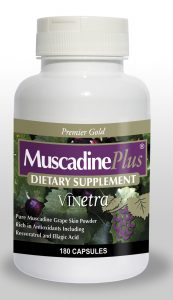Muscadine Grapes: The Mighty Fruit
The humble muscadine grape has been getting a lot of attention lately as a possible natural cancer treatment. This little fruit is packed with antioxidants and other nutrients that have shown promise in fighting cancer cells. While more research is needed, there is reason to believe that muscadine grapes could be a helpful addition to any cancer treatment plan. Here’s what you need to know about this potential cancer-busting fruit.
The History of Muscadines
Muscadine grapes, a grape native to North America ,are usually dark purple in color, but can also be light green and bronze. They belong to the species Vitis Rotundifolia and originate from the southeastern part of the United States, particularly in Virginia and states along the Gulf Coast. The illustrious “Mother-vine” was reportedly discovered by Sir Walter Raleigh’s colony on Roanoke Island.
This vine, which still exists today, has a trunk 2 feet thick and covers half an acre. There are several other names for the Muscadine grape that have been used over time. The original name for them was “Big White Grape” by the pioneers. Scuppernong, a little village in Washington County, North Carolina, was surrounded by cuts in the 17th and 18th century.
Cancer Research on Muscadine Grapes
In the recent years, there has been extensive research on muscadine grapes and cancer and it’s impact. The skin and seeds of the grape are known to be rich in antioxidants and may help reduce inflammation in the body. Studies suggest that consuming muscadine grapes may significantly decrease the need for chemotherapy drugs while still promoting cell death in cancer cells. In addition, muscadine grapes may help strengthen immune systems weakened from treatments, making them more effective at keeping recurrence of cancerous cells at bay. While further research is needed to completely understand the impacts muscadines can have on cancer patients, this initial evidence shows great promise for using the fruit as a complementary treatment for those dealing with this serious illness.
 Other Health Benefits
Other Health Benefits
Muscadine grapes have many amazing benefits for our health. Research has shown that they contain beneficial compounds that may help reduce inflammation, fight bacterial infections, and boost immune function. Muscadine grapes also offer a high level of antioxidants that help guard against cell damage caused by free radicals in the body. Additionally, muscadine grapes can lower cholesterol levels when part of a regular diet, which can mean a decrease in risk for certain heart conditions. In addition to being tasty and eaten as a snack or cooked into dishes, muscadine grapes are an amazing way to improve overall health and wellbeing.
How to Incorporate Muscadines into Your Diet
Incorporating muscadine grapes into your diet is a great way to experience the many health benefits they offer. Consuming them are easy and can be added to a variety of meals. Raw muscadine grapes can be enjoyed as a snack while they also make a great addition to salads or even cereals. For those looking for something more savory, muscadine grapes can also be cooked and added to savory dishes like curries and stews or used as a substitute for any other type of grape in recipes. Additionally, due to its natural sweetness, muscadine juice makes for an excellent substitute for sugary soft drinks and as a bonus, it is rich in tannins which has anti-inflammatory properties. With so many ways to incorporate them, it’s worth doing whatever you can to include muscadines into your diet.
Potential Side Effects
When it comes to muscadine grapes, the potential side affects you should be aware of are similar to those associated with consuming regular grapes. Eating an excessive amount of muscadine grapes can lead to upset stomach or diarrhea. If you are on a special diet, such as being diabetic, you should consult your physician and monitor your blood sugar level carefully due to possible changes in blood sugar levels when consuming these grapes. Additionally, individuals who take medication for high blood pressure and cholesterol may need to adjust their meds or dosage as muscadine grapes can lower these readings naturally. Finally, people who have allergies or sensitivities to muscadines possibly could experience hives, rash, digestive tract issues and other symptoms of food allergies after eating them. It is best to consume them in moderation and speak with your doctor first if necessary.
Muscadine Naturals Supplements 
Muscadine grapes are a unique variety of grape with many potential health benefits. They have been shown to be somewhat effective in cancer treatment, and they could also offer other health benefits such as promotion of healthy blood sugar levels and heart health. There are many ways to incorporate muscadines into our diet, including eating them fresh or taking supplements containing them. For over 17 years, Muscadine Naturals have provided a superior all natural dietary muscadine supplement. We grow all the muscadine grapes used in our products to ensure the variety and quality- and they contain no extracts or fillers. Visit our website to shop our all-natural products.

